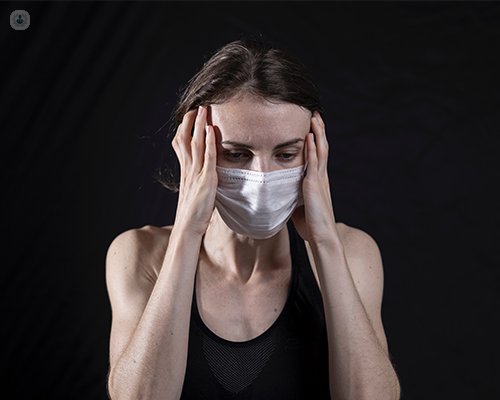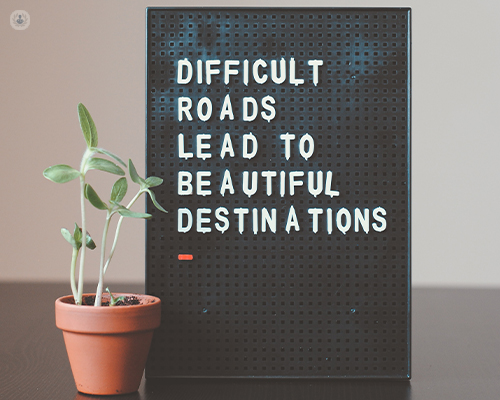Post-lockdown anxiety and what to do to help it
Autore:Even though lockdown ended a year ago, we are still living with coronavirus and the anxieties: work anxiety, re-entry anxiety, and more. Psychology clinics are seeing lots of clients with post-lockdown anxiety in their life. Consultant health psychologist Dr Sue Peacock gives us a deeper look into the effect this has had and especially on people with chronic pain.

Living with uncertainty during coronavirus
The first thing Dr Peacock says is: ‘Do not be surprised if you feel like this. You are not alone.’ Going into lockdown was a huge change and coming out of it was another one; change is often uncomfortable.
It is a very difficult time and often people feel frustrated. They have this idea that they should be open to things not being so bad even if we are not out of the woods yet. Instead, the clients feel worse rather than better. The virus has not disappeared, so fears have some ground to stand on. People worry about themselves, their families, getting on public transport again, or children returning to school.
To complicate matters, government messages seem more complex than before. It appears the government itself is not sure what is going to happen. Surely this adds to anxiety. During lockdown it was easy to follow the message ‘don’t go out’. Since then, more difficult messages have appeared such as ‘you can go out but you must distance’. Experts cannot agree about what this is and other safety procedures. Going out shopping or back to work may make you concerned about adequate safety, other people, and those not obeying the rules.
We accomplished one thing, and we can do others
There is also a basic psychological fact that change is scary. Many people got used to staying home months on end when they did not think they could. Now there is concern with returning to life as it was before, in the ‘new normal’. Breaking down the fears can be helpful.
Re-entry fear has at least two parts. The virus itself is one, as there are still new cases every day, new variations, and it can be fatal. Social anxiety is the other part. For example, maybe work was an uncomfortable environment that you have to return to.
How personalities have an impact:
- Introverted people likely felt comfortable at home and not with a larger group of people.
- Extroverted people may have had difficulty during lockdown and prefer being out again, but may also still worry about the virus.
However, some degree of anxiety is healthy to ensure social distancing and wearing a mask, for example. But take action if anxiety is making return to work or other activities difficult.
Slowly and steady wins the race to beat re-entry anxiety
Returning to work anxiety may make you feel less confident and worry more into an anxiety spiral as anxiety affects our ability to focus and our memory. It is difficult to stay sharp, focused, and do our job if we are anxious.
A slow immersion is best by setting small goals and building up over time. For example, start by walking to the underground station, then maybe go a stop or two before getting on fully. If possible, do it with someone else; you will feel more confident and talking about taking the new steps feeling is important.
Anxiety techniques to have at your fingertips:
- Practice deep breathing
- Take a relaxing audio with you.
- Try different things you find works best for you
Start as soon as you can, as social isolation is not good for most of us; the longer you wait, the harder it will be. Those with chronic pain especially are likely feeling lonely. Take advantage of being able to meet a few more people. It may feel strange at first, but keep going. It is a habit that is healthy to start up again. In the long-term, more changes will come from the pandemic and what you build now will help along the way. Similarly with work habits, think of ways to improve your game over time if your work has been at reduced levels.

With non-essential shops open again, consider going shopping if you enjoy it and maybe buy something for yourself. This is beneficial for your general mental health because it sends a message to your brain that going out is not just for essentials but also for fun, and a small move away from purely survival mentality.
Do not hesitate to get outside help If you still feel anxious after trying these. Perhaps you see an expert such as Dr Peacock, who use modern techniques of psychology and hypnotherapy to quickly solve problems. Check with human resources department if issues are around work; most employers recognize tensions and problems being faced and may have very good support services and networks available.
Post-lockdown is a good time to change habits
Now is the time to look at the habits possibly developed over the recent year—some good, some bad, some interfering with life. As life is changing, some may be getting in the way.
Not losing perspective, pay attention to things related to health, the virus, safety, and hygiene. Maybe it is time to change habits if your house is hospital-level clean. What are you doing at the moment? Now may also be time to put chronic pain self-management skills back on track, possibly keeping a diary for a fuller picture. Look at the evidence, think about it, and talk about it with those you trust. Consider any changes that would be beneficial at this point.
Finally, don’t lose a learning mindset. Change is a time to develop doing things differently and new aspects of your life. The pandemic has a long way to go, so make the journey as interesting and rich as possible.
If you think that you are going through anxiety post-COVID lockdown, you can book a consultation at Dr Peacock's profile.


